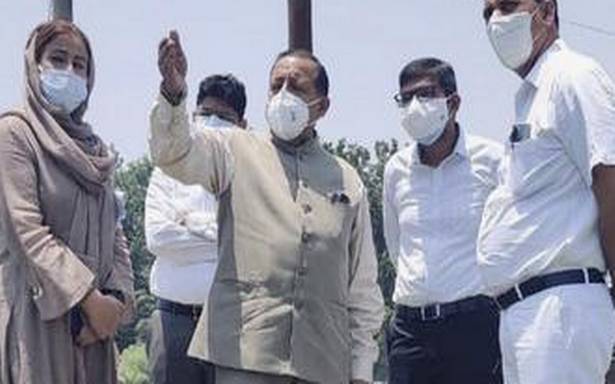The Union Minister of State for the PMO cities reforms of Modi Government like prevention of Corruption Act, abolition of interviews for Group C and D posts
Union Minister of State for the Prime Minister’s Office (PMO), Jitendra Singh, on Thursday, July 2, 2021, said more than 800 central laws have become applicable to Jammu and Kashmir after it got the Union Territory status.
Speaking after the inauguration of a semi-virtual regional conference on “replication of good governance practices” in Srinagar, attended by 750 officers from 10 states, he said the Modi government is committed to transparency and “justice for all”.
Also read | J&K parties find common ground on deepening democracy, early polls
“People-friendly reforms taken in the last seven years have benefitted the entire country including people of Jammu and Kashmir and Ladakh,” Singh, the Minister of State for Personnel, said.
“Many far-reaching reforms of Modi Government like prevention of Corruption Act, abolition of interviews for Group C and D posts and more than 800 Central laws became applicable to J&K after it got the Union Territory status,” he said.
The Minister cited several governance initiatives undertaken by the Jammu and Kashmir administration, including the long-pending cadre review, establishment of CAT benches, extension of RTI Act and conduct of the common eligibility test through the National Recruitment Agency at every district headquarter in the UT.
Also read: PM’s meeting with J&K leaders ‘positive’ step, says Karan Singh
Mr. Singh said the capacity building of 2,000 civil servants in collaboration between National Centre for Good Governance (NCGG) and the Jammu and Kashmir Institute of Management Public Administration and Rural Development (IMPARD) will be undertaken, a Personnel Ministry statement said.
He said the objective of the regional conference being organised by the Department of Administrative Reforms and Public Grievances (DARPG) was to familiarise officers with best governance practices.’
‘PM’s paradigm’
Mr. Singh said under the leadership of Prime Minister Narendra Modi, India adopted the “minimum government maximum governance” paradigm which is being cited and commended all over the world with civil servants from across the world visiting India to pursue internships.
“This regional conference coming one week after the all-party meet chaired by Prime Minister with the objective of promoting grassroots democracy and provide impetus to development has considerable significance with the adoption of the conference resolution titled ‘BehtarNizam e-Hukumat’ that will seek to ensure justice for all persons and regions of Jammu and Kashmir,” he said.
Mr. Singh announced the development of a district-level good governance index on the lines of the national good governance index, capacity building of 2,000 civil servants in collaboration between NCGG and IMPARD and a national conference to be conducted on governance in Jammu & Kashmir in the year.
He also released the DARPG’s e-magazine titled ‘Minimum Government, Maximum Governance (MGMG)’, comprising write-ups on administrative innovations during the inaugural session.
The minister also witnessed the exchange of an MOU between NCGG and IMPARD for capacity building of 2,000 civil servants, the statement said.
Mr. Singh said authorities must reach out to the last man in the queue and complimented the J-K administration for efficient Covid management.
The regional conference was also addressed by Manoj Sinha, Lieutenant Governor of Jammu & Kashmir; Sanjay Singh, Secretary DARPG; Arun Kumar Mehta, Chief Secretary J-K and V Srinivas, Additional Secretary DARPG, it said.
Source: Read Full Article

